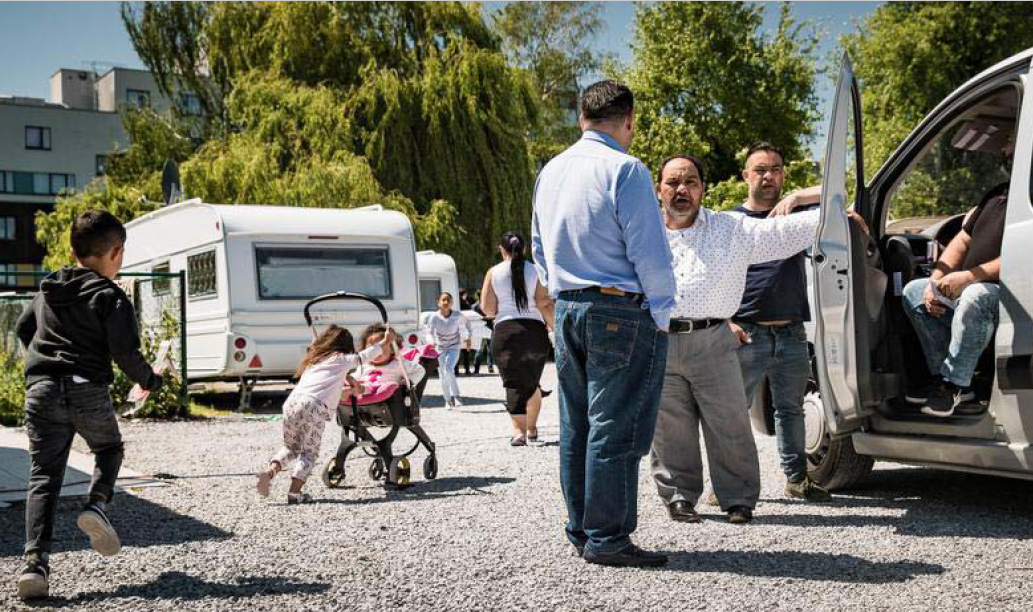Belgium's Police Raids on Romani Travellers Deemed Discriminatory by European Committee
20 June 2023

Brussels, 20 June 2023: The European Committee of Social Rights (ECSR) has issued a decision on the complaint “ERRC vs. Belgium (no. 185/2019)”, finding Belgium violated the rights of Romani Travellers during mass police raids in May 2019. The decision is binding, and Belgian authorities must demonstrate the measures it has taken to abide by the Committee’s decision. The collective complaint was lodged by the European Roma Rights Centre (ERRC) after the Belgian police launched the largest police operation the country had seen in over 20 years, targeting Romani communities living on permanent and temporary halting sites all over the country. The complaint relied on evidence and witness testimonies gathered by Unia, Belgium’s Equality Body, in their monitoring of the situation.
The Committee found that Belgian authorities had failed to demonstrate that they took “due and positive account of the particular housing situation and different lifestyle of the Travellers families concerned by the seizure of caravans, nor did they take sufficient steps to ensure that such families could effectively continue to enjoy their right to adequate housing.” Belgium was found to have violated Article 16, the right of the family to social, legal, and economic protection taken together with Article E (non-discrimination) of the European Social Charter.
“Police raids are by no means a uniquely Belgian phenomenon; they are one of the most visible manifestations of antigypsyism across Europe. But the scale of these raids in Belgium in 2019 shocked even us. This decision from the Committee demonstrates that the police’s seizing of homes and property of Romani people was discriminatory” said the ERRC’s President Ðorđe Jovanović. “The largest police operation in Belgium since the end of the second world war was an act of ethnic discrimination, I think that’s something people should be very concerned about.”
The Committee’s decision includes measures to promote the provision of adequate alternative housing for families, procedures to limit the risk of eviction, and in the case of the families whose caravans were seized, they are required to make sure those families are provided with alternative housing and not left without accommodation.
A statement published by Unia reminds the Belgian state that it has been condemned before by the European Committee on Social Rights for its general failure to provide suitable housing conditions for Travellers. In its statement, the Belgian Equality Body questions the appropriateness of the entire response from Belgian authorities during and after the police raids:
“Was it proportionate to quickly resell the seized caravans to third parties, given that these caravans were not holiday facilities, but the main homes of many families? Was a sufficient distinction made between caravans that were not in order from a legal point of view and others? Were the offers of temporary rehousing eventually made to some families a realistic option for people who don't live in buildings? In any case, the ECSR concluded that the Belgian State had not taken sufficient account of the specific nature of the situation, and that this was a violation of the European Charter of Social Rights.”
Background:
On 7th May 2019, over 1,200 police officers simultaneously raided 19 sites where Romani Travellers were living, arresting more than 200 people according to witnesses. Their belongings, and those of their friends and families, were seized including money, jewellery, cars, caravans, and other personal items. In the following days and weeks license plates for their vehicles were de-registered, bank accounts of innocent people were frozen, and the requisitioned vehicles were sold-off by the police. Further punitive actions continued for months later against other Romani people who were not even present at the original raids.
The police justified the large-scale operation (codenamed “Strike”) as part of an investigation into a used car scam being carried out over the internet. However, only a tiny number of those who were targeted had anything to do with the case. Many more had their homes, vehicles, possessions, and even money confiscated because of their ethnicity and their place of residence. The knock-on effects of these raids were severe, making hundreds of Romani people homeless, unable to access their money, and even more vulnerable to further harassment, hatred, and prejudice.
In May 2020, Belgium was ordered by the European Committee on Social Rights to provide emergency interim access to accommodation, water, sanitation, electricity, legal aid, and necessary medical and social assistance to the affected Travellers. The finding of violations in the recent decision on merits comes as no surprise to the ERRC, who has seen no evidence that the interim measures were adequately implemented.
The European Committee of Social Rights decision on mertis is available here.
For more information, or to arrange an interview, contact:
Jonathan Lee
Advocacy & Communications Director
European Roma Rights Centre
jonathan.lee@errc.org
+32 49 288 7679




